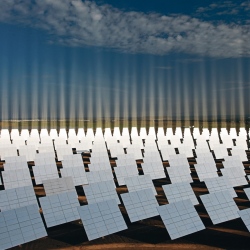
Semprius, a startup that makes miniscule solar cells capable of capturing concentrated sunlight without costly cooling systems, announced this week that it had made the world’s most efficient solar panel.
The company’s solar panels use tiny solar cells made of gallium arsenide—the record-breaking solar module contains hundreds of such solar cells, each about the width of a line drawn by a ball-point pen, arranged under lenses that concentrate sunlight 1,100 times.
Gallium arsenide is far better at absorbing sunlight than silicon, the material used in most solar cells, but it’s also more expensive. Furthermore, although concentrated solar modules use less semiconducting material, they usually require expensive optics, cooling systems, and tracking systems to keep them aimed at the sun. Semprius’s microscaled solar cells are inherently much better at dissipating heat, making them cheaper.
